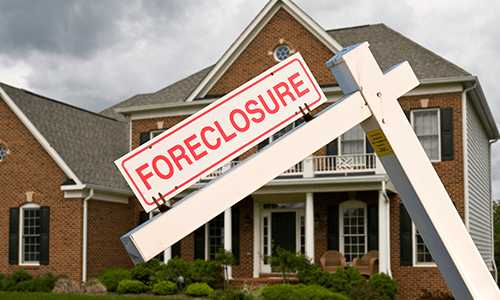It is not uncommon to find that when a unit owner fails to pay his/her assessments, they are also not paying their mortgage. Thus, oftentimes foreclosures go hand-in-hand with the collection of delinquent assessments. Fortunately for associations, the Condo Act addresses the association’s options with regard to collection of delinquent assessments when a unit is in foreclosure.
PRE-FORECLOSURE AMOUNTS – THE “6 MONTH RULE”
Section 9(g)(1) of the Illinois Condominium Property Act (the “Condo Act”), creates a lien in favor of a condominium association when a unit owner fails to pay their assessments. 765 ILCS 605/9(g)(1). Further, Section 9(g)(4) of the Condo Act was created in order to allow associations to recover a portion of the prior owner’s unpaid assessments from a new third-party owner.
Section 9(g)(4) of the Condo Act states as follows:
(4) The purchaser of a condominium unit at a judicial foreclosure sale, other than a mortgagee, who takes possession of a condominium unit pursuant to a court order or a purchaser who acquires title from a mortgagee shall have the duty to pay the proportionate share, if any, of the common expenses for the unit which would have become due in the absence of any assessment acceleration during the 6 months immediately preceding institution of an action to enforce the collection of assessments, and which remain unpaid by the owner during whose possession the assessments accrued. If the outstanding assessments are paid at any time during any action to enforce the collection of assessments, the purchaser shall have no obligation to pay any assessments which accrued before he or she acquired title. (Emphasis Added)
Under Sections 9(g)(4) of the Condo Act, associations can recover up to 6 months of unpaid assessments from a post-foreclosure purchaser (other than the bank – i.e. a third-party purchaser) provided the association attempted to collect from that owner before foreclosure concludes. Courts have generally interpreted the phrase “institution of an action” to be a lawsuit brought in court. Thus, it is highly recommended that, in order to preserve its right to collect under the 6 Month Rule, associations file a lawsuit under the Forcible Entry and Detainer Act as opposed to just initiating collections by sending a letter or 30-day notice and demand.
Additionally, Section 9(g)(5) of the Condo Act allows an association to collect from a post-foreclosure purchaser all costs and legal fees associated with a prior action to collect against the foreclosed owner. Section 9(g)(5) of the Condo Act requires that the notice of foreclosure sale state that the purchaser of the foreclosed unit (other than a mortgagee) shall pay the assessments and the legal fees required by Sections 9(g)(1) and 9(g)(4) of the Condo Act. There is no “6 month” limitation set forth in Section 9(g)(5) that would limit the costs and legal fees to only 6 months’ worth. Thus, under Sections 9(g)(4) and 9(g)(5) of the Condo Act, an association can collect 6 months of assessments plus all costs and legal fees associated with a prior action to collect against the foreclosed owner.
Similar rules apply to common interest communities via Section 18.5(g-1) of the Condo Act.
POST-FORECLOSURE AMOUNTS
Under Section 9(g)(3) of the Condo Act, an association’s lien for unpaid assessments from before the judicial foreclosure sale is not fully extinguished by the judicial foreclosure sale. Rather, the association’s lien for unpaid assessments is only extinguished when the foreclosure sale purchaser makes the assessment payment due after the sale. In other words, in order for a foreclosure sale purchaser, including mortgagees, to extinguish an association’s lien and avoid liability for the unpaid assessments from before the judicial foreclosure sale, the purchaser must begin paying assessments the month following the foreclosure sale to confirm the extinguishment of the lien created by the prior owner’s non-payment of assessments.
But how strictly does the statute to apply in order for a lien to be extinguished?
In 1010 Lake Shore Association v. Duetsche Bank National Trust Co., 2015 IL 118372 (Dec. 3, 2015), the Illinois Supreme Court held that a foreclosure does not extinguish an association’s lien for unpaid assessments until and unless the purchaser “promptly” pays post-sale assessments beginning in the month following the foreclosure sale. The Illinois Supreme Court analyzed the language of Section 9(g)(3) and held that it “plainly requires a foreclosure sale purchaser to pay common expense assessments beginning in the month following the foreclosure sale.” Id. at ¶ 24. The Court held that the second sentence of Section 9(g)(3) provides “an incentive for prompt payment of those post-foreclosure sale assessments, stating ‘[s]uch payment confirms the extinguishment of any lien created’ under subsection 9(g)(1) by the prior unit owner’s failure to pay assessments.” Id. Thus, the association’s lien is not extinguished, like other liens on the property, by virtue of the judgment of foreclosure. Further, when a purchaser fails to promptly make post-foreclosure sale assessment payments, the prior owner’s lien is not extinguished and the entire prior owner’s entire balance comes due by the purchaser.
The 1010 Lake Shore case has been a good friend to many associations when it comes to collecting delinquent assessments. On March 31, 2017, however, the Illinois First District Appellate Court issued an opinion which appears to muddy the waters and the interpretation of Section 9(g)(3) of the Condo Act and make things much more complicated for associations.
In 5510 Sheridan Road Condominium Association v. U.S. Bank, 2017 IL App (1st) 160279, a condominium association filed a lawsuit under the Forcible Entry and Detainer Act against a bank who purchased a unit at a foreclosure sale. The association sent a demand to the bank seeking both pre- and post-foreclosure amounts, as the bank failed to promptly pay all of the assessments due after the sale. Id. at ¶ 6. Shortly before the association filed its lawsuit, the bank made a partial payment, but did not pay the post-foreclosure assessments (nor the outstanding account balance) in full. Id. Nine months after the lawsuit suit had been filed, the bank made payment in full of the post-foreclosure assessments. Id. at ¶ 9 In making that payment, the bank argued that it had properly extinguished the lien. Id. at ¶ 9 The association, however, argued that Section 9(g)(3) of the Condo Act created a firm deadline for the payment of assessments – the first day of the first month after the foreclosure sale and thus the bank’s payment nine months late did not extinguish the association’s lien and thus the prior owner’s entire balance was also due . Id. at ¶ 10.
The First District of the Illinois Appellate Court disagreed with the association and held that Section 9(g)(3) does not set a strict deadline for when payment must be made. Id. at ¶ 20. The Appellate Court held that the first sentence of Section 9(g)(3) which states “from and after the first day of the month after the date of the judicial foreclosure sale” means only the time when the third-party purchaser must begins to be liable for post-sale assessments. Id. at ¶ 24. The Appellate Court determined that if the legislature intended for Section 9(g)(3) to contain a strict timing deadline, it would have included a deadline in the statute. Id. at ¶ 25. Accordingly, the Appellate Court held that since the bank paid the full amount of post-foreclosure assessments it owed, the association’s lien was extinguished, regardless whether it was made promptly or not. Id. at ¶ 32.
The Appellate Court’s opinion reached a very different conclusion than the Illinois Supreme Court did in 1010 Lake Shore, where it found a prompt payment requirement. 5510 Sheridan Road appears to provide that the as far as the timing requirement, purchasers of condominium units at a judicial foreclosure sale only need to make payment of any post-sale assessments prior to a judgment being entered in an action against the purchaser for failure to pay said assessments. But what happens if the third-party purchaser fails to timely pay post-sale assessments forcing the Association for file suit under the Forcible Entry and Detainer Act and pays only the assessments due after the suit is filed? Can an association recover the costs and fees incurred to file that lawsuit? How will a court view an association’s trial based only on fees and costs when all assessments have been paid? These questions were not addressed by the Appellate Court and will likely be a source of litigation in the near future.
By: Kathryn A. Formeller and Anita Jahanban







